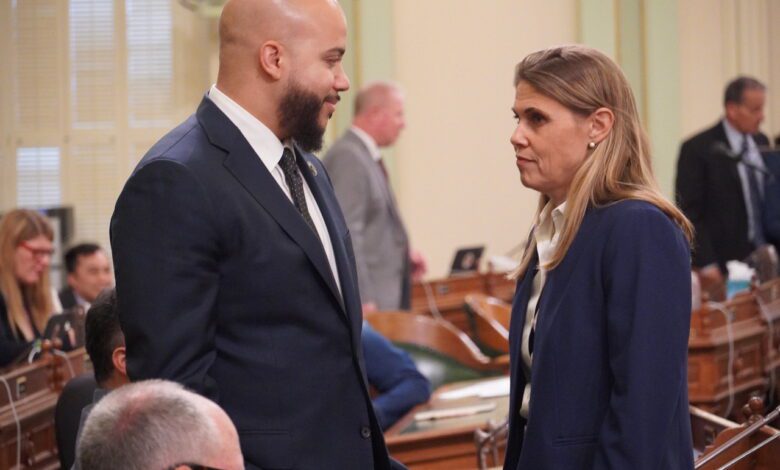Political Playback at California Capitol

Bo Tefu | California Black Media
Black Media Leaders Respond to Newsom’s Plan to Cut Journalism Fund by $20 Million
Last week, California Gov. Gavin Newsom proposed cutting $20 million from a landmark state initiative supporting local journalism, citing intensified financial pressures stemming from a projected $11.9 billion budget shortfall.
Called the Transformation Fund, launched in partnership with Google, the program was expected to provide $30 million in state funding to community media outlets for 2025-26. That figure has now been reduced to $10 million, the Department of Finance confirmed Wednesday.
“The sole reason for the reduction is more limited/fewer resources than projected in the January budget,” said Finance Department spokesperson H.D. Palmer.
The funding was part of a broader $250 million, five-year agreement between Google and the state, forged in response to the California Journalism Preservation Act proposed by Assemblymember Buffy Wicks (D-Oakland). The original legislation would have required Google to pay into a fund supporting news outlets based on journalist employment numbers. While the law was not enacted, the deal led to joint state and private support for local newsrooms and included a controversial $68 million AI initiative.
Rebuild Local News President Steven Waldman criticized the proposed cut: “Cutting it by two-thirds moves California in the wrong direction at a time when local journalism is collapsing across the state.”
Black Media leaders, however, said Newsom’s downsized $10 million investment –made at a time the state faces numerous uncertainties and constraints — is a notable first step to addressing the ongoing crisis in American journalism.
“While the Governor and Legislature face the very real challenge of closing a significant budget deficit, I deeply appreciate the state’s initial investment and Assemblymember Wicks’ continued leadership,” said Regina Wilson, Executive Director of California Black Media (CBM).
“This moment calls for bold thinking to protect one of the foundational pillars of our democracy — independent journalism. A well-informed public is not a luxury; it’s a necessity. It’s how people hold power to account, engage with their government, and shape the rules that govern their lives,” Wilson added.
The journalism funding rollback follows broader state cost-cutting efforts and the Governor warning of strained public resources as economic challenges mount.
The journalism fund was intended to help struggling newsrooms that have faced financial hardship, leading to fewer reporters covering vital civic issues. As budget negotiations begin, advocates are urging lawmakers to reassess the media funding cut, warning it could deepen the information gap in underserved communities.
Newsom Announces $3.3B for Prop 1 Behavioral Health Facilities
On May 14, Gov. Gavin Newsom announced the release of $3.3 billion in grants to significantly expand the state’s behavioral health infrastructure, aiming to combat homelessness and mental illness with thousands of new treatment opportunities.
The funding, made possible through Proposition 1, will help create over 5,000 residential treatment beds and more than 21,800 outpatient treatment slots for individuals struggling with mental health and substance use disorder (SUD). These investments are part of the Behavioral Health Continuum Infrastructure Program (BHCIP) Round 1: Launch Ready, administered by the Department of Health Care Services (DHCS).
“Californians demanded swift action to address our state’s behavioral health crisis when they voted for Prop 1 in March 2024. Today, we’re delivering our biggest win yet,” said Newsom. “These launch-ready projects will build and expand residential beds and treatment slots for those who need help.”
The funding represents the first of two rounds under BHCIP’s bond program. A second round, totaling over $800 million, will focus on unmet needs and is expected to open for applications later this month.
Michelle Baass, DHCS Director, called the funding “a generational investment in California’s behavioral health future,” adding, “We are building hope, dignity, and pathways to healing for thousands of Californians.”
The initiative is part of the broader “Mental Health for All” strategy to modernize the state’s behavioral health system and address a projected shortfall of over 7,000 treatment beds. The effort includes investments in mobile crisis infrastructure and permanent supportive housing, with up to $2 billion managed by the Department of Housing and Community Development (DHCD).
“These projects are a reflection of our values and vision for a healthier, more compassionate California,” said Kim Johnson, Secretary of the California Health and Human Services Agency.
Atty. Gen Bonta and Asm. Mike Gipson Condemn Federal Cuts to Violence Prevention Programs
California Attorney General Rob Bonta and Assemblymember Mike Gipson (D-Carson) are speaking out against the Trump Administration’s decision to cut over $800 million in federal grants supporting community violence intervention (CVI) programs nationwide.
The state officials say the move, led by U.S. Attorney General Pam Bondi, threatens public safety and disrupts efforts to prevent gun violence and support victims.
In a strongly worded statement, Bonta criticized the cuts, calling them “dangerous” and “irresponsible.”
“The Trump Administration is recklessly disregarding the safety of the people it is sworn to serve,” Bonta said. He added that eliminating these programs, which help victims heal and reduce violence, undermines both California’s and the nation’s progress. “If the Administration truly cared about public safety, it wouldn’t cut programs that are saving lives today,” Bonta said.
Gipson echoed Bonta’s concerns.
“This move undermines years of progress and puts lives at risk,” he said, emphasizing that many California CVI organizations now face difficult decisions, such as scaling back or shutting down entirely. “Cutting millions for California alone sends a clear message: that community safety is not a priority for this administration.”
The funding cuts affect several organizations across California. Programs like Advance Peace in Fresno, Youth ALIVE! in Oakland, and Urban Peace Institute in Los Angeles are among those losing millions in support. Advocates say these groups have played a key role in providing trauma recovery, preventing retaliation, and helping at-risk individuals avoid gun violence and gang involvement.
Bonta has held roundtables with CVI leaders to highlight their successes. He stressed the need for stable funding to support these efforts. “We urge the Administration to reinstate these vital grants and for lawmakers to continue to invest in lifesaving violence prevention and victim care,” Bonta said.
Community leaders warn the cuts will dismantle years of progress and put more lives at risk. Gipson, Bonta, and their partners are calling on the federal government to reverse course immediately.
Several community violence intervention programs in California lost federal funding without warning include:
- Advance Peace in Fresno lost a $2 million grant, leading to staff reductions.
- Youth ALIVE! in Oakland had its $2 million grant revoked, impacting the nation’s first hospital-based violence intervention program.
- Urban Peace Institute in Los Angeles lost $1.5 million in funding for training and certifying street outreach workers.
- Centro Cha Inc in Los Angeles was stripped of $1.5 million in federal support.
- Fresno County Economic Opportunities Commission lost $2 million in funding.
- The Reverence Project in Los Angeles had its $2 million grant terminated.
- Providence Health System in Southern California lost nearly $2 million in funding.
California Bill to Strengthen Small Business Support Gains Bipartisan Support
A bill authored by Sen. Eloise Gómez Reyes (D-Grand Terrace) to support small businesses in California has moved one step closer to becoming law. Senate Bill (SB) 781 passed the Senate Committee on Local Government with unanimous support from Democrats and Republicans.
“The Inland Empire is ripe with talent and opportunity, but the economic environment makes it difficult for small businesses to survive,” said Reyes. “SB 781 provides community-driven strategies and support to cut red tape and foster an environment that allows small businesses to breathe and thrive.”
If passed, SB 781 would help local governments create plans that make it easier for small businesses to win contracts and grow. These plans would include goals for hiring small businesses. They would also offer training for government staff and give local businesses more chances to compete for public work.
The bill also allows the California Office of the Small Business Advocate to guide cities and counties in helping small companies, especially those in areas that have fewer resources or slower economic growth.
Julian Canete, President and CEO of the California Hispanic Chambers of Commerce, said the bill would “support small businesses, expand their operations, create jobs and strengthen local economies.”
The bill would also let the state fund small business programs without depending on matching money from the federal government. This change would help local communities continue programs even if federal support changes.
More than half of California’s private-sector jobs come from small businesses. However, in areas like the Inland Empire, many small business owners still face challenges like lower sales and limited access to loans.
Recently, Gov. Gavin Newsom’s announced May 2025 as Small Business Month.
“California’s more than 4.2 million small businesses… embody the entrepreneurial spirit that drives the economy of the Golden State,” Newsom stated.
The Senate Appropriations Committee is currently reviewing SB 781. Committee members are expected to vote on it by May 23.
California Assembly Unanimously Passes Bill Strengthening Penalties for Soliciting Teens
The California Assembly unanimously approved a bill on Thursday that increases criminal penalties for soliciting sex from 16- and 17-year-olds. The measure aims to protect vulnerable teens and hold offenders accountable.
Assemblymember Nick Schultz (D-Burbank), chair of the Assembly Public Safety Committee, acknowledged the bill faced a “messy” process but said it is an important step forward.
“This is our solution to one of the most prevalent problems in the state of California, the exploitation and the trafficking of children,” Schultz said before the vote.
Originally, the bill’s author, Assemblymember Maggy Krell (D-Sacramento) wanted to treat solicitation of older teens as either a felony or misdemeanor to better target offenders and support victims. However, controversy arose when the felony provision was removed for cases involving 16- and 17-year-olds. After public pressure, Democrats agreed to apply stronger penalties only when offenders are more than three years older than the victim.
Assemblymember Pilar Schiavo (D-Chatsworth) spoke in support of the bill, sharing her own experience as a child sexual abuse victim. In an emotional statement, she described testifying against her abuser in court and living next door to him afterward.
“This experience continues to shape my views and actions when it comes to protecting children and victims of crime,” said Schiavo. “It’s one of the reasons I will always stand on the side of creating more support for victims and creating accountability for predators.”
While the bill was broadly supported, Assemblymember LaShae Sharp-Collins (D-La Mesa), a member of the California Legislative Black Caucus (CLBC) expressed concerns about parts of the law that criminalize loitering with intent to buy sex.
“When laws are vague, they are ripe for profiling,” said Sharp-Collins.
She warned that such provisions could disproportionately affect minorities and the poor, including Black, brown and the LGBTQIA+ individuals being overly policed and targeted for their mere presence in an area without them actually doing anything criminal.
The bill now moves to the state Senate for consideration.




